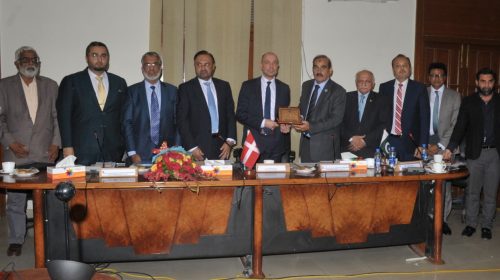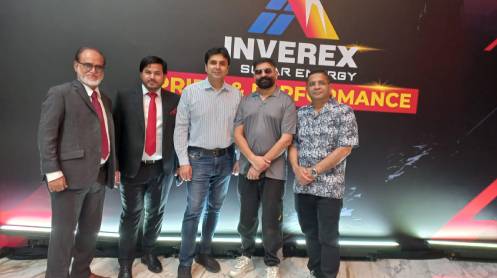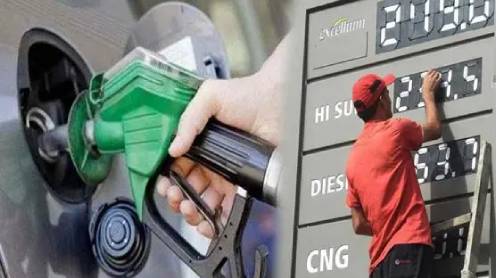KARACHI: Ambassador of Denmark Jakob Linulf, while referring to economic crises suffered by Denmark in 70s and 80s when it was also on the verge of bankruptcy, said that Denmark came out of these crises by coming with a concept of transforming oil & coal-based economy to a renewable and green economy, which helped in attaining a unique position and made Denmark standout from any other country around the world.
“Pakistan must also adopt a similar concept to deal with the economic crises as the country holds one of the best wind resources in the world and is in a perfect position to produce renewable energy for free by setting up wind turbines in Sindh and Baluchistan which can be connected to the national grid”, he added while exchanging views at a meeting during his visit to the Karachi Chamber of Commerce & Industry (KCCI).
President KCCI Iftikhar Ahmed Sheikh, Senior Vice President Altaf A. Ghaffar, Vice President Tanveer Ahmed Barry, Former President Majyd Aziz, Former Vice Presidents Haris Agar, Younus Soomro and KCCI Managing Committee Members were also present at the meeting.
Danish Ambassador further stated that solar panels can also be put-up to take advantage of the clear sun shine in Pakistan which would provide clean and cheap renewable energy, making the country less dependable on imported oil. “You also have fantastic hydro power resources which must be efficiently utilized for production of renewable energy. Renewable energy is an area where Denmark can give prudent advice and also the share know-how and technology with Pakistan”, he said, “My business proposition to you is to consider energy efficiency, energy conservation and renewable energy while Denmark is always there to assist you.”
He further stated that although some negative trends have emerged in Denmark-Pakistan bilateral trade and the trade volume was far below potential but there was room for enhancement of bilateral trade and investment between the two countries. “Even though Pakistan is the fifth biggest country of the world in terms of population which indicates a very big consumer base but the country is ranked at 60th position as trading partner of Denmark. We certainly need to be more creative and visionary in terms of expanding trade between Denmark and Pakistan.”
He said that Danish companies can look for trade and investment opportunities in Pakistan’s textiles, dairy, and agriculture sectors, particularly look into the possibility of exporting fruits and vegetables etc. from Pakistan. In this regard, a Danish delegation will be arriving in Pakistan in the month of March next year to look for Pakistani partners. “Denmark is a small country but definitely a big country when it comes to dairy production like milk, yogurt, cheese and the world-famous LURPAK products. There is a huge potential for Danish companies to not only sell more dairy products to Pakistan but also invest in the country’s farming business and develop the whole value chain of agriculture in this country.”
He also underscored the need to improve Pakistan’s perception in Europe as may European businesses were still reluctant to enter into the Pakistani market for investment, joint ventures and trade enhancement.
Earlier, President KCCI Iftikhar Ahmed Sheikh, while welcoming the Danish Ambassador, pointed out that despite having cordial and friendly relationship with Denmark, the bilateral trade volume was far below its full potential which needs to be enhanced to a reasonable level by exploiting available opportunities for further economic integration.
He noted that Pakistan’s exports to Denmark were stagnant at $208 million in FY23 as compared to $295 million last year, representing a negative growth of 29 percent on a year-on-year basis.
He said that Pakistan’s GSP plus status will be expiring in December 2023 and the country remains committed to the full implementation of 27 international conventions related to GSP Plus. “Denmark as the leading economic EU leader played a significant role in securing the GSP Plus status for Pakistan in the past. We hope that Denmark will play a similar role in the extension of Pakistan’s GSP Plus status beyond December 2023.”
Commenting on Danish expertise in foodstuffs, machinery, instruments, pharmaceutical products, Mineral fuels, Vehicles, Dairy, Electricals etc., he said that there were good prospects for pursuing joint ventures in these areas which would help Pakistan in its effort to attract maximum Foreign Direct Investment. “There is substantial room available for Pakistani products like halal foodstuff, textiles, and cotton, where Pakistan can enhance its exports to Denmark.”
He stressed that as Pakistan has been facing acute energy crises, Danish companies, having expertise in the energy sector, particularly wind energy and biomass-to-energy, can help Pakistan learn from the Danish experience and knowledge in dealing with energy shortfalls.
While luring Danish investment in mineral resources of Pakistan which hold enormous potential, President KCCI informed that the government has recently established Special Investment Facilitation Council (SIFC) to facilitate foreign investment and the country expects to attract up to $70 billion in FDI in three years mainly in Pakistan’s mineral resources.
Denmark Envoy advises Pakistan to transform oil & coal-based economy to renewable & green economy





